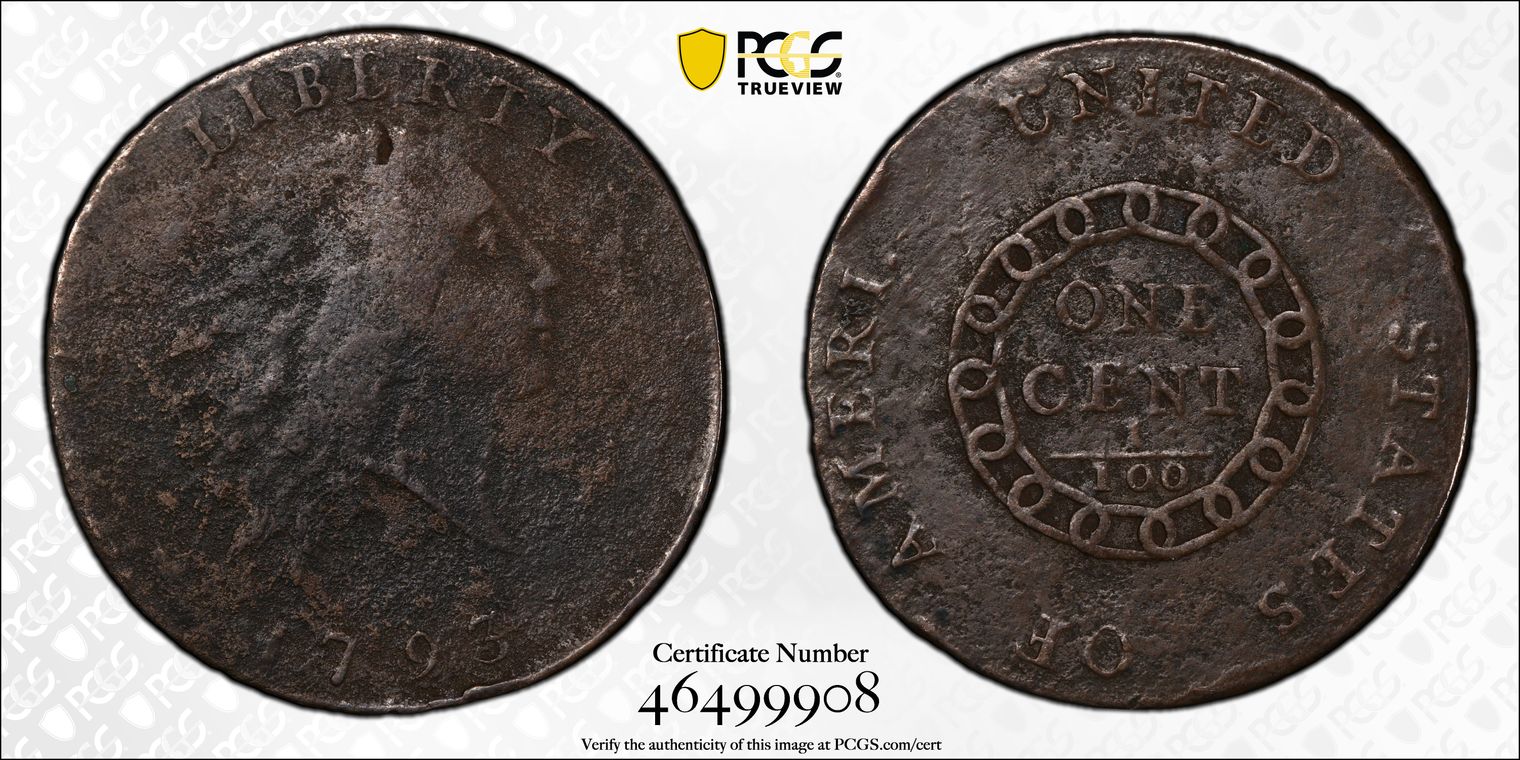1793 1C Chain, AMERI., BN N1BN 认证号46499908, PCGS号1340
专家评论
Denis Loring
The Chain AMERI often comes with a very weak date. In fact, several are known with the sharpness of Very Good but the date is completely gone. There is also a rare late die state with a rim break over TAT. As the first regular issue United States coin, the Chain AMERI is always in demand.David Hall
The remarkable Gem AMERI graded SP65BN by PCGS is from the incredible Ted Naftzger collection. The Naftzger collection was not only the greatest large cent collection ever assembled, it was one of the greatest coin collections ever assembled. Naftzger worked dilligenty on his set for 40 years and what he accomplished may never be duplicated. The SP65 Chain AMERI literally has semi-PL surfaces. It is amazing that a Chain cent could survive in such outstanding condition.
Ron Guth
According to Sheldon and Breen, the AMERI. variety was the first of the Chain Cents (the obverse die was used later with a reverse with AMERICA spelled completely). Why the abbreviation? The spacing of the reverse suggests that the engraver began the word AMERICA too high on the die. Had AMERICA been spelled out completely, it would have ended too close to UNITED (the spacing on the later reverse has AMERICA starting lower on the die). Breen repeats the speculation that the abbreviation was deliberate, following the style of the unfinished pyramid on the Great Seal of the United States, but there is no evidence to support such an association.
This was the only use of the reverse die which, in a later state, shows a crack over TATE of STATES that eventually develops into a rim cud. The obverse die was used later on Sheldon 2.
Sources and/or recommended reading:
"Penny Whimsy" by Dr. William H. Sheldon
"Walter Breen's Encyclopedia of Early United States Cents 1793-1814" by Walter Breen
Gordon Wrubel
Chain cents were the first mass produced, regular issue coins stuck at the fledgling US Mint. A total of 36,103 were coined from February 27 to March 12, 1793. The Liberty Head obverse and Chain reverse designs were were severely criticized by many observers of the day. The acute need for a standard coinage, however, assured wide circulation through all fifteen States at the time. Chain cents can exist in high Mint State grades, perhaps saved for posterity as first year issues. But most survivors are lower grade. In the lowest grades, the date and legends are sometimes worn to the point where little more than the Chain and some of the letters "ONE CENT" within it are distinguishable. This makes variety attribution extremely difficult, if not impossible, in cases where only a shadow of the Chain exists.Quickfinder Notes: The first Chain cents struck are considered to be the AMERI. variety, Sheldon 1. On well worn examples, where the word AMERI. is not distinguishable, the variety may still be able to be determined by checking the "C" of "CENT". The baseline of the C will be BELOW the baseline of the adjacent E. If even a shadow of the A in AMERI. is discernible, it will be in the 8:00 position. On the other reverse used on Chain cents, the "AMERICA" reverse, Sheldon 2, NC-1, 3 and 4, the baseline of the C is slightly ABOVE the baseline of the adjacent E. If the first A in AMERICA is distinguishable, it will be in the 7:30 position.
稀有性和存量估计 了解更多
| 所有评级 | 187 |
| 60或以上 | 2 |
| 65或以上 | 1 |
| 所有评级 | R-7.1 |
| 60或以上 | R-9.9 |
| 65或以上 | R-10.0 |
| 所有评级 | 1 / 3 |
| 60或以上 | 1 / 3 TIE |
| 65或以上 | 1 / 3 TIE |
| 所有评级 | 1 / 3 |
| 60或以上 | 1 / 3 TIE |
| 65或以上 | 1 / 3 TIE |






















